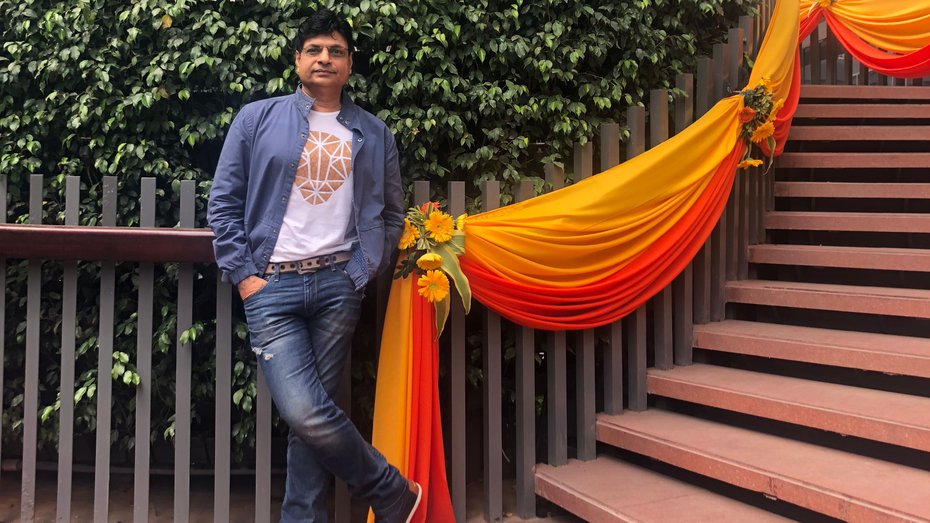Malerkotla (Sangrur Distrit) , PUNJAB / Mumbai, MAHARASHTRA :
The Bollywood lyricist and poet says freedom of expression means staying within prescribed limits

For a lyricist, Irshad Kamil sure has a sense of irony. His caller tune is a song from the Ranbir Kapoor-starrer Rockstar, sung by Mohit Chauhan. It goes: “Jo bhi main kehna chahun, barbaad kare alfaaz mere… Whatever I want to say is ruined by my words.”
Perhaps even more ironic: these words belong to Kamil himself.
I meet Kamil at a five-star hotel in east Calcutta. The 48-year-old is in town to talk about his book — Kaali Aurat Ka Khwab. It is about his first Filmfare Award and the journey to it. He is wearing a T-shirt and ripped jeans, and a jacket with shiny buttons. Perched on his nose are rimless glasses and there is a string of sweat beads on his forehead.
This is the man who has written songs such as Nadaan Parindey, Agar Tum Saath Ho, Patakha Guddi and Baby Ko Bass Pasand Hai. Life. Melancholy. Woman power. Dhinchak. As we get past the exchange of pleasantries and into small talk about how his lyrics are the stuff of social media posts, the soft-spoken Kamil orders another black coffee — his third in an hour.
If moved by his songs you have ever tried or are planning to google the man, know this: you are not getting to know much beyond his work. Discreet, I ask. He replies, “I am not an advertisement.”
But that does not make him reticent either. He is happy to talk about his poetry — turns out he wrote his first one in the late 1980s. He says without sounding the least bit pompous, “The reason people like my poems and lyrics is because I don’t talk about fake emotions. I put myself in the shoes of the audience. And I talk about the real life. Aap samajh rahe hain na? Yeh reality ke zameen se nikle hue shabd hain…”
It seems no one in Kamil’s family had an ear for music. His father was a chemistry teacher at Government College, Malerkotla, and he pushed all his children to study science. Kamil, alas, was an arts enthusiast. He wrote poetry and acted in school plays. In college, he tells me with some pride, he was the prolific writer of love letters for self as well as others. He quotes Urdu poet Bashir Badr as if in a toast to those days, “Jis par hamari aankh ne moti bichhaaye raat bhar, bheja wahi kaagaz usse, humne likha kuch bhi nahin.”
Eventually, our conversation shifts to political correctness in the creative arts, in day-to-day life. “People try to be politically correct, but that’s the problem. I have never tried to be,” he waves his hands animatedly to make his point.
I nudge Kamil towards specifics before he floats away on another rivulet of verse. As a lyricist, does he have freedom of expression? He unleashes a torrent of thoughts, “Of course, there is pabandi [restriction]. What the sarkar calls unrest is basically kranti [revolution] and kranti comes through the pen, through words and writings. People know there are particular forms of art and culture where it all comes from. And this is not new. It has been there since Safdar Hashmi’s times. We have expression of freedom but there are limits too. Till you praise them or agree with them, you have the freedom…”
Kamil wrote a song called Mere Achchhe Din Kab Aayenge for the 2018 film, Fanney Khan — Do roti aur ek langoti/Ek langoti aur woh bhi chhoti/ Isme kya badan chhupayenge/Mere achchhe din kab aayenge. “Just because of this song, the movie was put on hold by the Central Board of Film Certification,” he says. The song was tweaked and later released as Achchhe Din.
Kamil talks about how he dropped out of engineering. He fled to Shimla from his hometown in Punjab. Decided not to return for the next nine months. Joined theatre and earned Rs 45 a show. On returning, he decided to pursue Hindi for his graduation. The writer Irshad Kamil was in the making. His dimples nearly swallow his cheeks as he says, “Some people say I am a closed-door rebel.”
I tell Kamil that for someone who goes by that epithet, he is surprisingly controversy-free and he furrows his brows. “Do you know about Pahal patrika,” he asks. Seeing my expression, he starts to talk about how he is the only “filmi geetkar” to have poetry published in this Hindi literary magazine. He takes out his phone from his jacket pocket and reads out loud a poem titled Jootey — a journey of the shoes by the shoes.
His poem Tum Mujhe Tanaav Do talks about problems of the increasing population and the government and ends with an altered version of the famous line by Subhas Chandra Bose. It reads, “...tum mujhe tanaav do, main tumhe khadi dunga. Tum mujhe khoon do, main tumhe abadi dunga.”
source: http://www.telegraphindia.com / The Telegraph, online edition / Home> People / by Manasi Shah / May 30th, 2020








